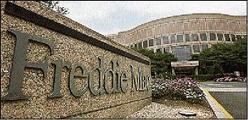
Wilberne Persaud, Financial Gleaner Columnist
Inviting shareholders to Fannie Mae's May 20th 2008 annual general meeting held in New Orleans, board chairman Stephen B Ashley told then of the US$40 billion committed to rebuilding in the devastated region.
His idea: showcase Fannie Mae's optimism.
The year 2007 was Fannie Mae's 70th and it ended much like the year of its founding - one of crisis for housing in America.
"Fannie Mae was created in 1938 to help America's housing market recover from the Great Depression," said Ashley.
"Today, we are helping housing to weather what many are calling its greatest crisis since the Depression."
His optimism didn't pan out. Call it bailout, takeover, conservatorship, nationalisation, last week's Fannie Mae and Freddie Mac are gone. It's like placing the last two members of an endangered species in the nature conservancy - they've lost their freedom but not their lives.
But the point is everybody else's life support depends on theirs. It's as if Fannie and Freddie provided filters and fans required for non-toxic financial breath to America and the world. Their filters clogged, leading to the 'too big to fail' strategy.
Freddie's and Fannie's stock price fell precipitously in July leading Secretary of the US Treasury Henry Paulson to ask Congress for its authority to rescue the companies should it become necessary.
"If you've got a bazooka and people know you've got it, you may not have to take it out," Paulson said at the time.
Not so fast. In financial markets sometimes people want to see the flash, hear the boom.
US housing market teetered
Fannie and Freddie lost perhaps US$14 billion this past year. The US housing market teetered as values plummeted. That's a correction.
Unlike stock markets, however, which might take an adjustment and bottom out in a relatively short period, this is not the behaviour of a housing market.
Perhaps quicker than anticipated, Secretary Paulson felt he had to take out his bazooka.
In taking over the two giants, he said: "This turmoil would directly and negatively impact household wealth: from family budgets, to home values, to savings for college and retirement."
Their "failure would affect the ability of Americans to get home loans, auto loans and other consumer credit and business finance. And a failure would be harmful to economic growth and job creation," he said.
All of this is true. We may add: these impacts would be worldwide.
These two institutions, the Federal National Mortgage Association (Fannie Mae) and the Federal Home Mortgage Corporation (Freddie Mac) have an interesting history.
They have operated since 1968 and 1970 as GSEs, or government sponsored enterprises.
Implicit support
They were privately owned companies answerable to shareholders, but benefiting from implicit support and subsidy from the Federal Government.
President Johnson privatised Fannie Mae in 1968 taking it off the budget in face of fiscal pressures of the Vietnam War. Two years later Freddie Mac was created to break the monopoly.
Freddie and Fannie purchased and bundled mortgages for resale as securities but held some in their own portfolio.
Together, they own or guarantee about half of America's US$13 trillion mortgage market.
Japan, China, others in Asia, Europe and the world invested, some heavily, in securities they market.
If they failed, as fear emerged and spread world financial markets would collapse as confidence evaporated. So it appears this was an action mandated by events.
That's as far as consensus can go. First, it is amazing to consider analysis of the issues as presented by some of America's network financial commentators.
Reckless
They speak as if Freddie and Fannie were the only true villains in this theatre of non-regulation. Compensation packages and life styles associated with Freddie and Fannie were out of sync they suggest, these two were reckless.
Anyone buying into this gets a jaundiced, truncated view of merely one corner of the whole picture.
Other parts of the picture are more troubling.
The charge is that a Republican administration is using this episode in a political and ideological crusade. If this is true we haven't seen its end.
Part of why more than 80 per cent of the American public sees its current path as wrong and President George W Bush has the lowest job approval rating of any President ever is the fact that the Republicans - recent Congress and White House - had elevated ideology to unprecedented levels.
Some of the policy implications this leads to are impossible to justify or defend unless you are an unrepentant partisan.
Fannie and Freddie are but the tip of an iceberg of 'irrational exuberance', as Alan Greenspan called it, allowed by laxity in regulatory control of mortgage lending and securities rating occurring much lower down the food chain.
Fannie and Freddie happened to be at the top.
Duped
Senator Chris Dodd, Democratic chairman of the Senate banking committee, claims he was duped by Treasury Secretary Paulson.
He believed Paulson, and by implication the Bush administration, that he would not 'take out' the bazooka Congress gave him.
So Democrats believe that conservative ideology which holds that the public policy element of Fannie Mae and Freddie Mac should not exist is the hidden agenda of an attempt to determine policy long after President Bush leaves the White House.
Used authority aggressively
Senator Dodd says Congress "accepted him (Paulson) at his word that all he needed was the authority and that he wasn't going to exercise it. Then he used his authority very aggressively."
Not to have contemplated this outcome seems unbelievable. The British and Europeans find it sometimes difficult to hide the disdain in which they hold the practice of US public policy, particularly of the Bush White House.
They feel it is amateurish and 'cowboyish'.
The trouble is world stock markets respond to policy shifts regardless of underlying motives. What then is the verdict? This takeover became inevitable. What future role for the entities?
That's a matter of US internal politics.

The takeover of US mortgage giants Fannie Mae and Freddie Mac places enormous power in the hands of a new regulator, the Federal Housing Finance Agency. - AP
wilbe65@yahoo.com

